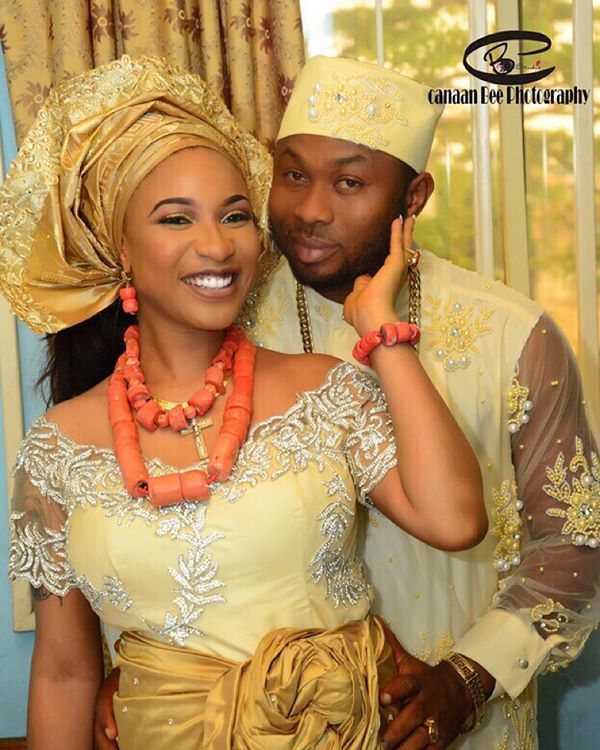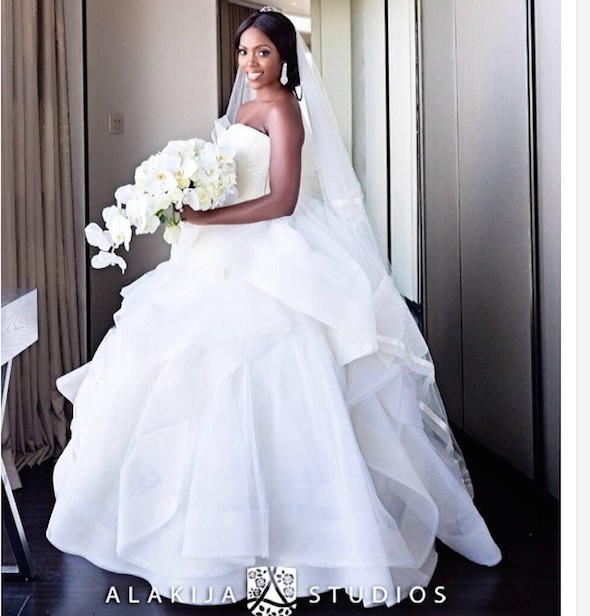
 For those whose tastes run towards the scandalous spectrum, with regards to the news that they consume, the crisis presently rocking the two year old marriage of Nollywood actress, Tonto Dikeh and hubby, Oladunni Churchill has been a slice of heaven. Playing out across countries, plus live on Instagram posts and Youtube videos, the once happy union has collapsed scandalously amidst accusations of theft, abuse and sexually transmitted diseases.
For those whose tastes run towards the scandalous spectrum, with regards to the news that they consume, the crisis presently rocking the two year old marriage of Nollywood actress, Tonto Dikeh and hubby, Oladunni Churchill has been a slice of heaven. Playing out across countries, plus live on Instagram posts and Youtube videos, the once happy union has collapsed scandalously amidst accusations of theft, abuse and sexually transmitted diseases.

Because human beings are merely a function of their environment and events do not occur quite randomly without a sociologic basis, the end of the union for Ms Dikeh and her hubby, as well as for Ms Makinwa and Mr Ayida may in the end be symptomatic of a larger problem, one with roots existing in the way that we live and the way that we are raised as human beings.
Marriages of famous people have always been juicy fodder for the tabloids and will continue to interest a world that is obsessed with celebrity culture but hidden behind the splashy headlines and the revelatory details, and the lurid pictures, are the stark, and sometimes desperate minutiae of ordinary people navigating the institution of marriage and trying to make meaning of the contracts that were entered into for better for worse, separable only by death.
A brief history of marriage
The picture of modern marriages that has crystallized is that presented by religious and legal institutions. Christians base their unions on the foundations of monogamy and fidelity while Muslims allow for polygamy but still embrace the ideas of fairness and fidelity.
According to Nigerian law, three types of marriages are recognized; the statutory, customary and Islamic marriages. The statutory marriage is essentially marriage by law, under the marriage act. This can be consummated in the registry or a licensed place of worship by either a registrar or ordained minister. Marriages recognized under this umbrella have to be heterosexual and monogamous. No middle ground.
Marriages under customary law are referred to commonly as the traditional wedding. They allow for polygamous relationships (mostly on the part of the male partner) and also accommodate the families of the celebrants via provision for parental consent and payment of bride price/dowry. Islamic marriage bears some similarities to the customary marriage in that it encourages polygamy and allows the man to take up to four wives should he desire.
But unions in Nigeria between men and women predate the constitution which is in itself, a gift of colonialism; a fairly recent construct in relationship to the pre-ancient institution of marriage. Biblically, the first recorded union was when God put Adam to sleep and created a woman, Eve from his left rib.
Historically there has always been the need for human beings to forge relationships and create bonds and marriage was merely one way of accomplishing these. American author and historian, Stephanie Coontz, the author of “Marriage, a History: How Love Conquered Marriage,” (Penguin Books, 2006) described the historical basis of marriage as “a way of getting in-laws, of making alliances and expanding the family labor force.”
And this makes sense. Unions were popular between family members who married within to keep bloodlines intact. The agrarian and defensive nature of the world’s economy also mandated that unions were set up for strategic alliances and to strengthen strongholds.
Catherine of Aragon, youngest daughter of King Ferdinand II and Queen Isabella I of Spain is an example of a royal who was wedded twice to two brothers, mainly to establish a powerful alliance between England and Spain. Prince Arthur, her first husband died in 1502 at the age of 15 after exactly 20 weeks of marriage. Seven years later, Catherine was wed to Henry VIII, Arthur’s younger brother, effectively establishing the Tudor line’s authority.
Thanks to Greek mythology, the story of the very married Queen Helen of Troy who ignited the Trojan war when she eloped or was abducted,- depending on what version you are acquainted with,- from her husband, Menelaus by the smitten Prince Paris of Troy.
In Nigeria, early tribal groups preferred to marry within themselves, purely because of familiarity as they rarely interacted with people of other ethnicities. As trade posts began to open up, gradually people began to mingle with one another. As folks began to make more money, the reality of wealth differentiation began to seep in and parents began to set up marriages for their offspring based on status and power privileges. Kids were betrothed from as early as their infancy days to their future partners, leaving them with very little say in such matters.
Customary marriages are deeply rooted in patriarchal structures but these values aren’t necessarily restricted to African societies. The essence of marriage as imported from the missionaries and the colonialist educators is also patriarchal at its core. As civilizations developed and the Church gained greater influence, the practice of polygamy in the West was increasingly frowned upon but the very idea of monogamy as initially practiced was slanted to favor the male species.
Men were expected to take one only wife but society was willing to look the other way while sometimes openly endorsing dalliances with multiple partners. Not so for women who were not only expected to accommodate their straying men but were publicly shamed and ostracized when caught in illicit romances.
Love is
Fast forward to 2017 and it would seem that no two people get married anymore without convincing themselves and the world around them that they are head over heels in love. The ubiquity of social media platforms like Facebook and Instagram has helped amplify these declarations especially among both the Generation X and the millennials, to the extent where it seems like the L word is all that matters when choosing a life partner.
There are a whole range of reasons why people take the plunge and decide to make their union legal but historians suggest that love did not begin to factor in up until the Victorian era when the queen and her husband, Prince Albert engineered one of the first major displays of public affection, describing their union as a ‘’love match.’’
As love began to assume greater significance so did the feminism movement, as well as the idea of equality among sexes. Women’s rights became human rights and marriage, within the last five decades, especially in the West has come to be viewed as a composition of two equal halves. Proponents began to push an updated view of marriage as an equal partnership, where men and women take on identical obligations as opposed to unique, gender-based roles.
With more women entering the workforce than ever before and contributing to the upkeep of the family in addition to their socialized roles as nurturers, partners began to conceive of their unions in terms of love, flexible divisions of labor and companionship. The institution of marriage has over the years evolved to allow room for equality for both sexes where sauce for the good is sauce for the gander.
Lemonade ish

One of the biggest news items of last year for instance was the very public dissolution of the union between pop star Tiwa Savage and her husband Tunde ‘Teebillz’ Balogun. In the process of promoting her cryptic new single, If I start to talk, the singer released a music video that went to some dark, uncomfortable places, carrying with it, hints of domestic violence and triumph over spousal abuse. Balogun went on a total melt down, accusing his erstwhile wife of everything from infidelity to a refusal to prepare meals for her family.
Savage was not about to let any damage be done to her person or career and her response was culled straight from Beyonce’s Lemonade playbook, albeit not as sophisticated. Engineering a carefully controlled yet sympathetic interview with This Day journalist, Azuka Ogujiuba for Pulse.ng, Savage pulled no punches as she turned the tables around, revealing a marriage that was deeply dysfunctional at its core.
She also gave a voice to the challenges faced by modern, working class women out there. That it isn’t nearly enough to go out there and hustle daily bread, out earn your hubby, service his ego, nurse a toddler and keep a high profile career buzzing along nicely, the woman was still at the end of the day, expected to come back home to do the needful; prepare food for her man.
This scenario may or may not be relatable to the realities of the majority of wedded couples but the perceived increase in divorce and separation rates reveal that there is a deeper problem that society isn’t coming to terms with. As more and more women get access to equal education opportunities, they are likely going to feel less inclined to endure some borderline human rights abuses that society expects them to put up with in the name of marriage.
Time was when the married woman was expected to play the role of doormat, to be trampled on severally while she attempted everything within her power to keep her marriage intact. These days though, with higher profile divorces and separations hitting the papers daily, it would seem that the tide is turning and the women have no such compulsion to stick around when there is nothing within for them.
If I start to talk…
Granted, celebrities have always been a poor reflection, sample wise of what the larger population is actually going through. Their privilege, plus wider opportunities available to them ensure that they are able to take risks and get away with some of them. The National Bureau of Statics (NBS) agrees with this too. In its latest peep into the lives of married men and women, the nation’s statistical body of record puts the official divorce rate at 0.2% for men and 0.3% for female, according to The Economist.
It isn’t quite clear how the NBS arrived at these figures but the reality is there are a whole lot of separations and divorces going on nationwide that slide by unreported. The stigma that is attached to people (especially women) who dare to leave their matrimonial homes for whatever reason, ensures that many people are never bold enough to announce their marriage failures to even close friends and families.
‘’I would say it is an epidemic actually’’ says Ifeoma Anichebe a clinical psychologist with a local Non-Governmental Organization (NGO) who has worked with scores of younger couples seeking various interventions in their marriages. ‘’The truth is even though we pretend otherwise, everyone knows at least one person who is separated or going through difficult times in their marriages. It is hard for me to point out any particular reason(s) as responsible but I have heard and seen all sorts. Infidelity, violence, infertility, insecurity… they are only the tip of the iceberg.’’ She adds.
Tales from the beat
To try to get a scope of Nigeria’s divorce problem, at least as far as those being reported, one only needs to visit any of the Customary courts in Lagos where domestic disputes are usually heard. The Customary court in Ikorodu, a Lagos suburb, has been a hub of activity in this department and has provided juicy material for many a blog or online publication looking for quick domestic dispute stories that can generate web traffic.
This beat, once the domain of trashy tabloids now has traditional media like the Vanguard dedicating reporters to man and churn out reports. The stories are as funny as they are sobering. In January this year, the paper reported on Abiodun Sokoya, a 49-year-old man who pleaded with an Ikorodu Customary court in Lagos State to dissolve his 19-year-old marriage over his alcoholic wife’s regular visits to a public bar. The case was adjourned till March.
Joseph Aduwo’s 10 year old marriage was dissolved by the Igando Customary court in June last year, because his wife whom he described as ‘’a pastor, evangelist, a church interpreter and women leader,’’ fought with ‘’nine persons in a day on our street, wearing only bra and underpants.’’ ‘’She is a shameless streetfighter,” he concluded.
The women have not been left out. Last month, an Ibadan housewife, Mrs Omolara Adeyemi, approached an Idi Ogungun Customary Court, Agodi, to dissolve her 11-year-old marriage on the grounds of her husband’s inability to impregnate her. ‘’ I cannot allow another man to sleep with me as long as I am still married to him,” she stressed.
At the Iyana-Offa Grade C Customary court, also in Oyo State, pregnant citizen Biola Gani-Ajala is seeking the dissolution of her marriage to her husband on grounds of infidelity and lack of care. She insists her husband Kabir, is a dead beat father and isn’t the person responsible for her present pregnancy. “We have been married for 22 years but I don’t want him again,’’ she declared.
Happily never after
Truth be told, there isn’t an abundance of credible data on marriage and divorce rates and most of what is available is subjective. Customary marriages are not always documented and the patriarchal bent of our society ensures that the men almost always get away with bad behavior.
Going by the data provided on celebrities, customary court records and social media reports, it would seem that a divorce crisis is heading our way, ready to knock off the basic structure of family life as we know it. There is of course the matter of same sex unions lurking in the not so distant future.
Even though NBS data may suggest otherwise, a minefield of data on sociologic behavior is just lying fallow, waiting to be studied by researchers and put into use formulating more significant hypotheses that can open up deeper conservations.
It would be quite presumptuous to declare the end of an entire centuries’ old institution based on perceived information that hasn’t been put to the test. But one element is more plausible, marriages as defined by Nigerian institutions may be pushing towards the next big wave, powered by urbanization, education, empowerment and globalization. It would be all so exciting if it wasn’t already scary.
Courtesy: YNAIJA


![Iyabo Ojo reunites with ex-husband, Ademidun for daughter’s traditional wedding [VIDEO]](https://lifeandtimesnews.com/wp-content/uploads/2025/04/1000618821-238x178.jpg)



![Iyabo Ojo reunites with ex-husband, Ademidun for daughter’s traditional wedding [VIDEO]](https://lifeandtimesnews.com/wp-content/uploads/2025/04/1000618821-100x75.jpg)
